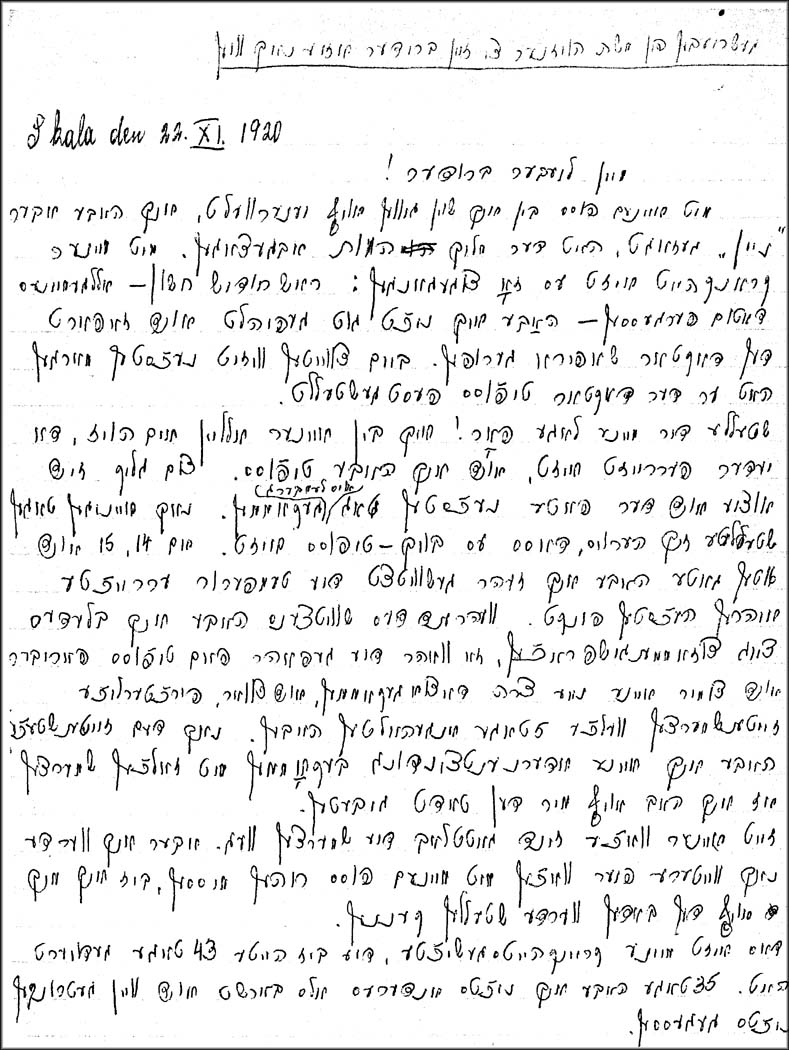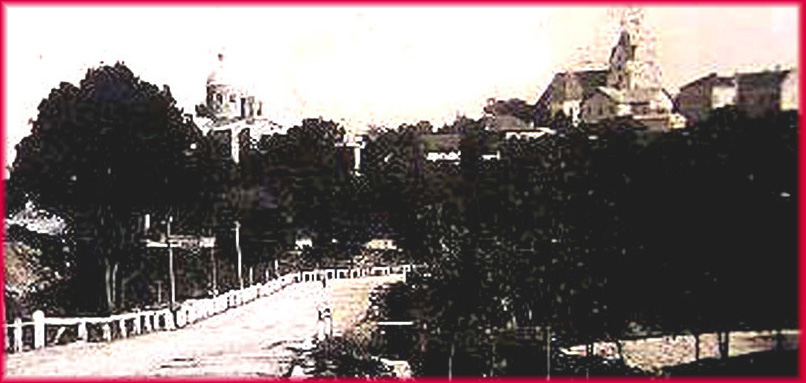
What follows are excerpts from an 18-page letter written in 1920 by Moshe Hausner to his brother Itzie in Vienna. In it, Moshe Hausner vividly describes what life was like in Skala towards the end of World War I, when the town alternately came under the rule of the Bolsheviks and the virulently anti-Semitic Ukrainian Petlura militia. Only parts of the letter have been translated from Yiddish. Among the sections not translated reportedly is one in which Hausner told how the aged Vizhnitzer rabbi was forced to sweep the streets. Some personal details have been omitted. There are no dates mentioned, other than the one at the beginning of the letter.
For more information about the family of Moshe and Itzie Hausner, see The Family of Zalman Hausner.
November 22, 1920.
My beloved brother,
With one foot I already was in the other world, but I said no to the Angel of Death, and he stepped back. My illness came about as follows: The first day of the month Sivan [ed. note: usually corresponding to May/June] I felt sick and immediately called Doctor Shapira. Yesterday, during his second visit, he diagnosed that I was suffering from typhus.
Image my situation! I am a person alone in the house – everyone has gone away – and I have typhus. On the 14th, 15th, and 16th days I sweated terribly and my fever reached its highest point. When the sweating finally stopped and the typhus was over, another trouble beset me: terrible cramps in my side, which lasted five days. After that I developed a vein inflammation. I was in such pain that I begged for death. The pain ceased a week ago, but I still must rest for four weeks until I will be able to “stand on my own feet.” This is the story of my illness, which lasted for 34 days. For 23 days I drank nothing but borscht and wine.
Eight days later, the Bolsheviks moved forward past the bridge until the house of Melczer. There, however, they were met with opposition. There were three dead and three were captured. Eight days thereafter, the Bolsheviks launched another offensive and the Petluras had to retreat.
During the first eight days it was calm and life went on as usual. On the 19th day, the instructors and commissars from the state took over the Revolutionary Committee [RevCom] and assumed all the functions [of governance]. The RevCom was not elected by the public.
In Skalar, the RevCom consisted of the cobbler Charpita, Gratzka the speculator, Huneovich, Anastagievski, Senoras for education, Shissler for work organization, Grandpa Meir Baruch Zilberbush, the Poles Gusky and Reganovich and, finally, Berish Kizia Weidberg.
After the election,, the RevCom became active and searched 20 to 30 houses --- to give orders in some and to pass out rules, such as that everyone must be registered, entry and exit [from the town] are forbidden, etc. Several [people] were required to pay [a tax of] a Soviet ruble, 2 kronen, two Polish marks, two Swiss francs, and one half-dollar. This is called justice. There also were 20 strong militiamen who, with the help of their bayonets and white armbands robbed one or two shops and houses every night. From us they took several sacks of corn and barrels of honey.
 | View of Skala within a decade of when Moshe Hausner wrote this letter |
We don't need more than one suit, one coat, two shirts. If anyone has more, it is confiscated. In larger estates, the rules are different. If they have hidden belongings, they are found and confiscated. Every second day a new house is searched by a counter-revolutionary who looks for material and clothing. Anything found that was not registered and reported previously is taken.
Meanwhile, our Itzie was arrested in Chortkov, where he had been hiding after Skala changed hands. Then he was released. Four days later the RevCom left. They searched the house again, but did not find Itzie. However, on the eve of Rosh Hashanah, Itzie was arrested once again and was ordered to appear at one of the revolutionary tribunals. Three residents of Skala ---Abraham Frankel, Ben Tzion Fiederer, and Zaida Kanser -- personally guaranteed [his appearance]. It took our entire fortune of 155,000 Soviet rubles, 48,000 grivna, 4,000 Kerenski rubles, 6,000 Karbawantzas, 600 Nikolayevski rubles, and 3000 Kronen to set Itzie free until the hearing.
Two days later a wonderful thing happened: we were freed from the Communist regime. Thursday morning, we found out that the Ukrainians had broken through the front. The first Ukrainian State patrol that appeared on Friday afternoon we greeted with elation.
The Bolsheviks ran for two days between Zbruch and the Dniester. Imagine how terrible it was for us under the Bolsheviks that we greeted the Petluras with elation. Although we had heard of pogroms in Probuzhna and Yezherzana, they passed uneventfully by us.
During the short time that we were under the Red regime, half of the hair on my head fell out. One day I worked voluntarily for a builder in his field. You cannot imagine the grim faces of our people. The next day I contracted dysentery at the builder's and could not go to work anymore. My face was broken out and I was required to stay in bed for eight days.
During the ten-week Red rule, the Revcom organized mass gatherings every Sunday. In the church they blasphemed [religion] and incited people against it. The general population remained passive. At the head of the Galician government is the Skalar baron and a man named Zatinsky.
If the Reds had stayed any longer, all three of us would have had to [join the army?]. The mobilization already has begun. The first Sunday that the Reds were not here anymore was designated as “Poverty Day,” meaning that each of the poor people was given the right to go to a rich home and take whatever struck his fancy and then go to a church and take the Sunday clothes from the rich Christians.
This Shabbos was supposed to be the Jewish Poverty Day: that is, the poor Jews could go to the rich Jews and take whatever they pleased. Berish Kizia organized these Shabbos and Sunday poor days. On this Shabbos and Sunday the [?] Sunday was proclaimed in Kaminetz Podolsk: that is, every worker and [peasant?] had the right to [?] every woman and girl, willingly or unwillingly. Luckily they did not carry it out. [During this time] all important Skala personages were arrested except for two: Berish Kizia and Charpita, who had managed to hide.
That's how it was under the Bolshevik rule. The worker hungers, as the [?] gives the work. The Russian state did not pay the workers with money but with foodstuffs: for ten days [of work], five pounds of bread and ten pieces of sugar. In short, the Reds made our lives miserable.
Last week, the Kaminetzer Jewish work detail came a long way by foot. They seized the opportunity [and took everything with them] and, with wives and children in hand, escaped across the border, so as not to be under the rule of the communists.
Letter copyrighted by Tony Hausner